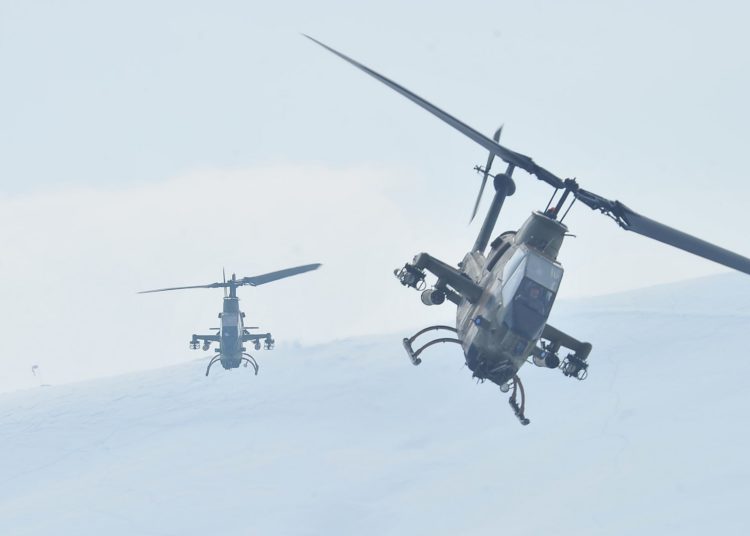Abdullah Bozkurt
The Turkish army believed a missile that was used to down a Turkish Cobra helicopter on May 13, 2016 by an outlawed Kurdish group was provided by Russia in retaliation for Turkey’s shooting down of a Russian Su-24 jet in airspace over the Turkish-Syrian border on November 24, 2015.
An assessment of the incident by the military was revealed during a court hearing in the Turkish capital of Ankara on June 9, 2017 by Mehmet Şahin, a staff colonel who was a pilot at the Land Forces Air Command, which operated the downed AH-1W SuperCobra attack helicopter. He said it was the Russians who orchestrated the shooting down of the Turkish helicopter with an SA-18 Russian-made and man-portable, infrared homing surface-to-air missile.
“The Russian navy went through the strait [in Istanbul] displaying an air defense missile, which I thought was the shoulder-fired SA-18. … The Russians first showed the missile on the Bosporus, and then they downed our AH-1 Cobra attack helicopter in Hakkari [province] on the Iraqi border. Two of our pilots were martyred in that incident,” he said. “We reviewed it many times, an analysis was made, and it was confirmed to me that the SA-18 was most probably the same missile displayed on the ship,” he added.
Transcript of the testimony of Col. Mehmet Şahin, who accused Russia of giving the missile that downed the Turkish Cobra chopper to the PKK:
Şahin was referring to a rocket-brandishing incident on a Russian warship passing through Istanbul’s Bosporus Strait on December 6, 2015. The Caesar Kunikov sailed through the Bosporus with a soldier holding a shoulder-fired, surface-to-air missile on the deck throughout the journey. It was an unusual spectacle and was widely reported in the Turkish media. Turkey described the brandishing of a missile as a provocation and summoned then-Russian Ambassador Andrey Karlov to the Turkish Foreign Ministry the next day.
The Foreign Ministry told the Russian envoy that the Turkish public was uneasy over footage of the passage and that there was a feeling the people’s security had been threatened. The ministry asked Russia to comply with the 1936 Montreux Convention, which regulates the right to passage of warships through the Bosporus and Dardanelles straits.

The passage of the Russian warship through the Turkish strait came amid escalating tension between Turkey and Russia after a jet incident that resulted in the death of one of its pilots. Turkey said the plane was shot down because it violated Turkish airspace, while Russia denied a violation had occurred and vowed serious consequences as a result. Russian President Vladimir Putin described the downing of the Su-24 as “a stab in the back.”
Calling Turkey’s downing of the Russian jet a “war crime,” Putin said, “We will remind them not just once about what they have done, and they will feel sorry about it more than once,” he said without elaborating on what other measures Russia planned to take.
NATO stood by Turkey when the Turkish air force shot down the Russian warplane but urged de-escalation and calm to avoid a large, inadvertent confrontation between the two sides. Three frigates from Canada, Spain and Portugal operating within the NATO service had been moored in İstanbul on the day the Russian warship passed through the Bosporus.
According to Şahin, the missile was delivered to the Kurdistan Workers’ Party (PKK), an outlawed Kurdish secessionist group that is listed as a terrorist organization by Turkey, the European Union and the United States.
“Subsequently, Russia’s open support for the PKK, the YPG [the PKK’s Syrian offshoot, the People’s Protection Units] and the PYD [the Kurdish Democratic Union Party, also affiliated with the PKK] began, and Russia continued to demonstrate its support by showing its flag [in YPG-controlled territory]. Then, as you know, Russia established itself firmly in Syria. Turkey could not even have its jets fly closer than 10 to 15 kilometers to Syrian airspace,” Şahin explained.
He claimed that the Turkish military had been considerably degraded by massive purges after a failed coup on July 15, 2016 and had been weakened against Russia, a country he said was the main beneficiary of the coup attempt, which many believe was a false flag orchestrated by the Turkish president.
The Turkish police warned in May 2016 that the PKK possessed 50 similar missiles that could be used to down Turkey’s Cobra helicopters. The intelligence picked up by police indicated that PKK militants had moved weapons and ammunition from its Şehidan camp in Iran. The Turkish army acknowledged six days after the downing of the chopper that the PKK may have hit the Cobra with a missile but did not say anything on the origin. Two pilots in the helicopter as well as six troops defending an outpost on the border were killed, while 13 were wounded in the attack, the statement said.
Video of the shooting down of the Turkish Cobra helicopter:












